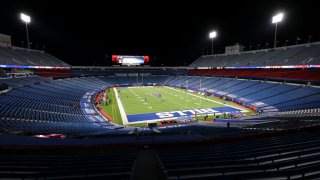
Even as he issues his final pleas to New Yorkers to celebrate the holidays safely and avert a new potential shutdown, Gov. Andrew Cuomo acknowledges that the ultimate goal -- large-scale vaccination of the public -- remains months away.
With indoor dining still closed, for the second time, in New York City, and cluster zone areas restricted elsewhere, Cuomo said Wednesday he's looking at potential ways to mitigate the economic impact until "herd immunity" is accomplished.
Some of the latest projections expect that to happen in mid-June. Others project it won't happen until the end of the year.
"We cannot go through a year with the economy shut down. We can't," Cuomo said Wednesday. "How do you balance that? How do you keep the economy open safely while you're waiting to hit full vaccination?
"Can you reopen venues using rapid testing?" the governor asked rhetorically.
That's the precise question he says the state Department of Health has been analyzing -- and he wants to do a "demonstration project" with the Buffalo Bills, which will host an NFL playoff game this season. The objective is to find out what happens in terms of spread if fans provide a negative COVID test pre-game, are allowed into the stadium and the state conducts contact tracing afterwards.
“The devil is often in the details,” Cuomo said. “We would like to do it.”
Tracking Coronavirus in Tri-State
If that model, which Cuomo and state Department of Health Commissioner Dr. Howard Zucker says has never been tested before, works, could it be applied to other venues?
State Budget Director Robert Mujica said the state is reviewing a proposal by the Bills involving 6,700 fans. The plan allows for the Bills to control stadium entry and exit by fans, who would have to provide proof of a negative COVID test.
The team has committed to social distancing and mask mandate enforcement. Fans who won't comply with the latter will be ejected from the stadium. Sections of the stadium will be closed for social distancing and ushers will enforce that. Tailgating would remain banned.
Department of Health representatives have traveled to other NFL stadiums where fans are permitted, to varying degrees, to assess the viability of such a program in New York, Mujica said. They're comfortable with that, he added.
It's the testing piece they're still working to figure out. And right now the proposal is far from finalized. Cuomo says the state would like to move forward with it, but there are legitimate concerns -- and the potential for situations not foreseen.
Zucker says his prime concern is that even if the state can control the testing and tracing element, the "ancillary events, the parties are where this virus can spread, the events at the airport, that's how disease spreads. How do we control that?"
It's the "newest piece which no one else is doing anywhere in the country, but as the governor points out, this would be the beginning to show how you could start events with testing and all the other mitigation factors we have," Mujica said.
Cuomo says he hopes to provide an update in his upcoming State of the State.
"This next chapter is not about fixing a budget hole in the state budget or the city budget," Cuomo said. "This next challenge for next year is how does the post-COVID world realign economies and societies? What is the lasting effect of the COVID experience? The Zoom calls don't go away. The work from home doesn't go away. The public health consequences don't go away."
"What is a city without restaurants and arts and museums and culture and symphonies? What's the attraction of a city without that? These are big questions. It's not about how do we fill the hole. We have a much bigger challenge."
Locally, the idea is getting pushback in a region that’s been hit hard by an uptick in COVID-19 in recent months.
Erie County Executive Mark Poloncarz said that his administration hasn’t been part of any discussions about the idea and that it hasn’t come up on recent calls with state officials. And he said the county doesn’t have the capacity to do rapid testing on 6,700 individuals, typically performing 1,450 tests a week.



